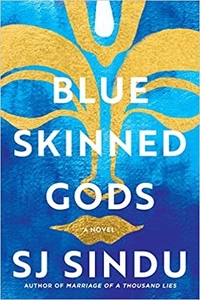Blue-Skinned Gods by S.J. Sindu
 Monday, November 1, 2021 at 6:19AM
Monday, November 1, 2021 at 6:19AM 
Published by Soho Press on November 2, 2021
People engage in spiritual journeys to achieve personal growth. Blue-Skinned Gods tells the story of a man who needed to shed the cloak of spiritualism before he could find himself.
Kalki has blue skin. In an ashram on the outskirts of Tamil Nadu, Kalki’s parents raise him to be a god, the tenth incarnation of Vishnu. Kalki sometimes thinks he sees earlier incarnations, particularly Krishna. During playtime, he reenacts stories from Hindu mythology, always playing the heroic god. As Kalki gets older, he leads meditation and yoga sessions in the ashram. Even as a child, he engages in prayers and rituals that heal visitors. Or, at least, he believes he is healing them.
Despite — or because of — his status as a god, Kalki lacks faith. At some point he comes to realize that gods don’t need faith. Others have faith in their gods, but gods have nothing to prove. Yet Kalki has doubts, even as he passes tests that prove his divinity. S.J. Sindu plants clues that allow the reader to understand that the tests might be rigged, that Kalki’s father is using Kalki to attract believers to their ashram. Kalki is his meal ticket. He jealously protects Kalki from any outside influence that might have a negative impact on the ashram. Unfortunately for Kalki, his father believes that any glimpse of the larger world might divert Kalki from the course that his father has plotted.
Culture and religion are significant forces in the story’s background. Kalki’s family follows Vishnu. Kalki’s controlling father refuses to allow him to read Hindu texts favored by worshippers of Shiva. More important to the plot is India’s caste system. When Kalki falls in love with Roopi, a girl he believes he cured who works as a servant at the ashram, Kalki’s father puts an end to their relationship. Roopi comes from one of the higher castes but she isn’t Brahmin and therefore wouldn’t be a suitable mate for Kalki even if he were a mere mortal. Kalki’s father also forbids a friendship between Kalki and a transvestite whose status as a hijra is honored by Hindu mythology. Sindu illustrates social injustice in India by contrasting the god Kalki is forced to be with gods in his lineage who were less concerned with caste and sexuality.
As Kalki gets a bit older, foreign visitors to the ashram give him insight into the world he has never glimpsed. Kalki reads books that his father has forbidden for fear that literature might open Kalki’s mind to new understandings. One of those visitors exposes Kalki’s father as a hypocrite. A female visitor who might be in love with Kalki’s mother drives a wedge between his parents.
Kalki’s best friend is a cousin named Lakshman. Kalki’s true test comes when Lakshman’s mother is stricken with cancer. Lakshman and Kalki are separated for years after Lakshman moves to America. Their next meeting marks a turning point in the novel.
The last half of the story is driven by Kalki’s identity quest. If Kalki is not a god, perhaps he is a guru. Or maybe he’s a drunk. Or bi. Or a singer. As Kalki tries to understand himself, he knows only that he feels like a fraud who has harmed the people he cares about. It’s not easy being blue.
The story is told in memory. We learn early on that in the present, Kalki is a professor. He tells his students that religion is in a crisis perpetrated by scandal: Catholic priests and Hindu swamis using their positions to sexually abuse children; Middle Eastern honor killings, terrorist acts, and extreme reprisals committed in the name of religion; Buddhist monks inciting genocide in Sri Lanka. Having come to understand that he was not a god but a fraud, it is no surprise that the adult Kalki views much of religion as perpetuating a harmful charade for the benefit of charlatans.
The story at times threatens to become a soap opera, particularly when the controlling nature and unfaithfulness of Kalki’s father drives Kalki’s mother to an extreme response. Sindu's characterization of the father is a bit heavy handed. A scene in which Lakshman explodes at Kalki over a perceived grievance makes little sense, given that Lakshman is just fine with Kalki before and after the explosion The attempt at inclusiveness (including an off-camera gay sex scene) sometimes feels a bit forced. The plot loses some of its appeal after Kalki journeys to America and experiences a whirlwind identity crisis.
Yet the story as a whole is engaging. The lessons it offers about religion and intolerance, truth and fraud, are worthwhile. And Kalki, blue skin notwithstanding, comes across as representative of other young people whose parents have tried to fit them into a life that pleases the parent without regard to the child’s right to find his or her own way of living.
RECOMMENDED
 TChris |
TChris |  Post a Comment |
Post a Comment |  India,
India,  S.J. Sindu in
S.J. Sindu in  General Fiction
General Fiction 


